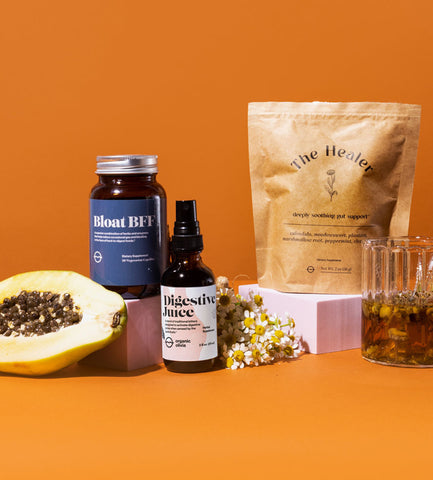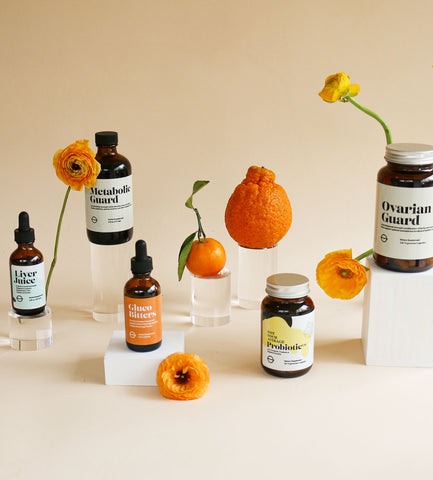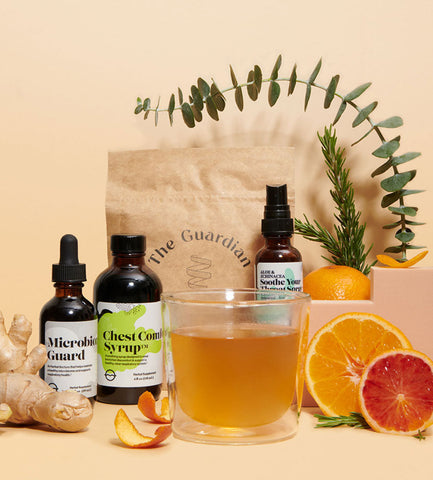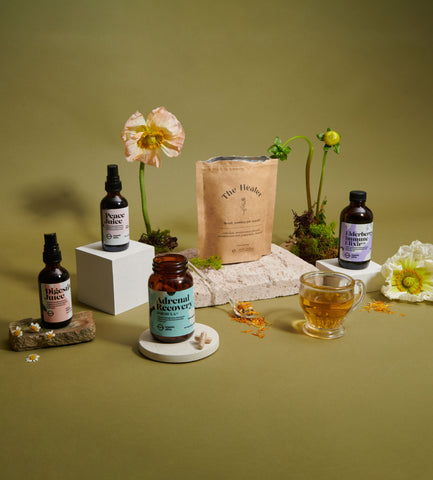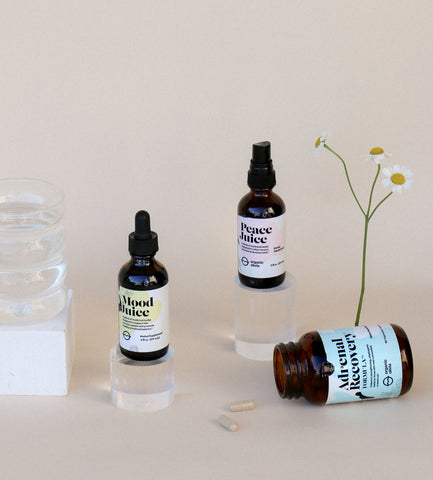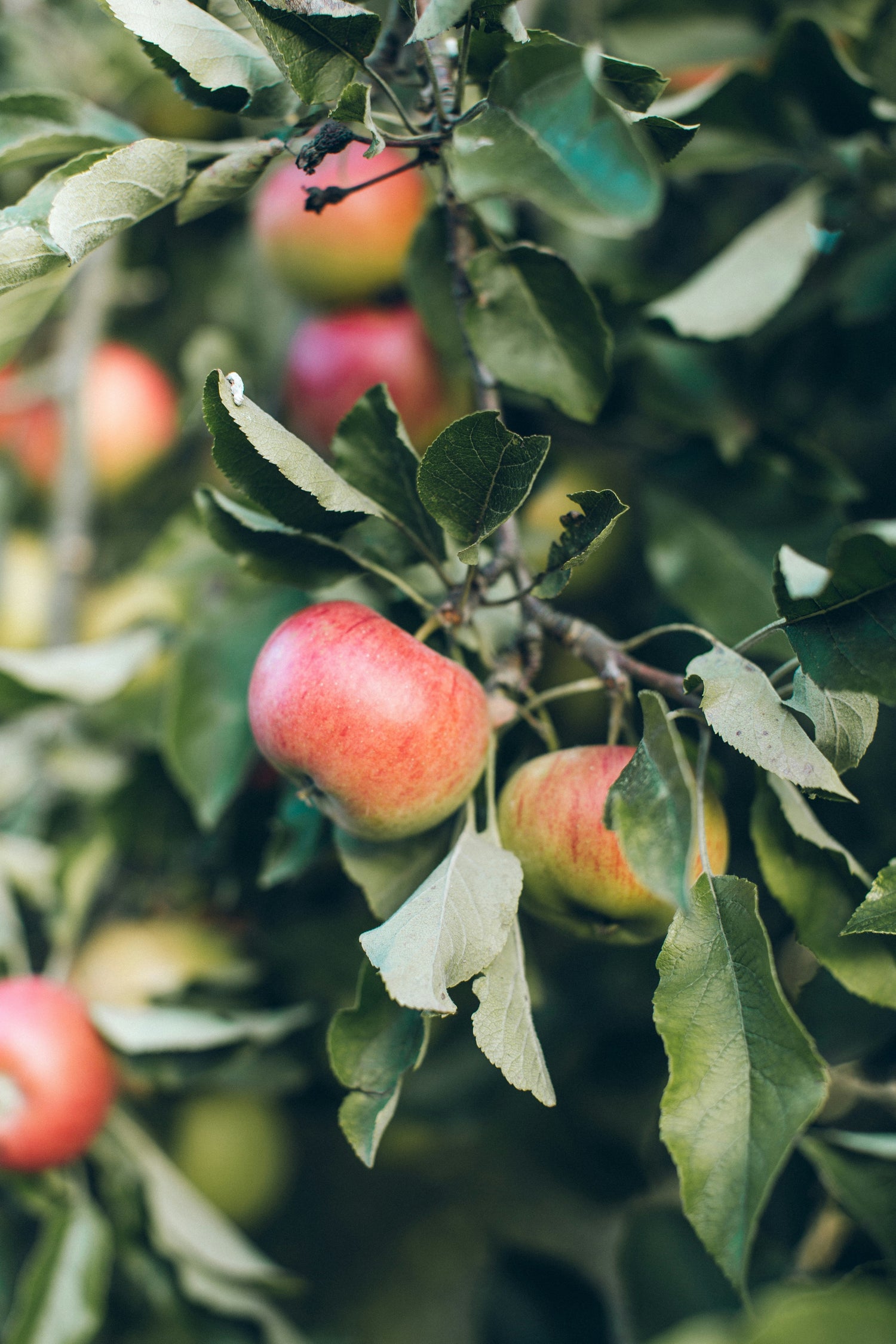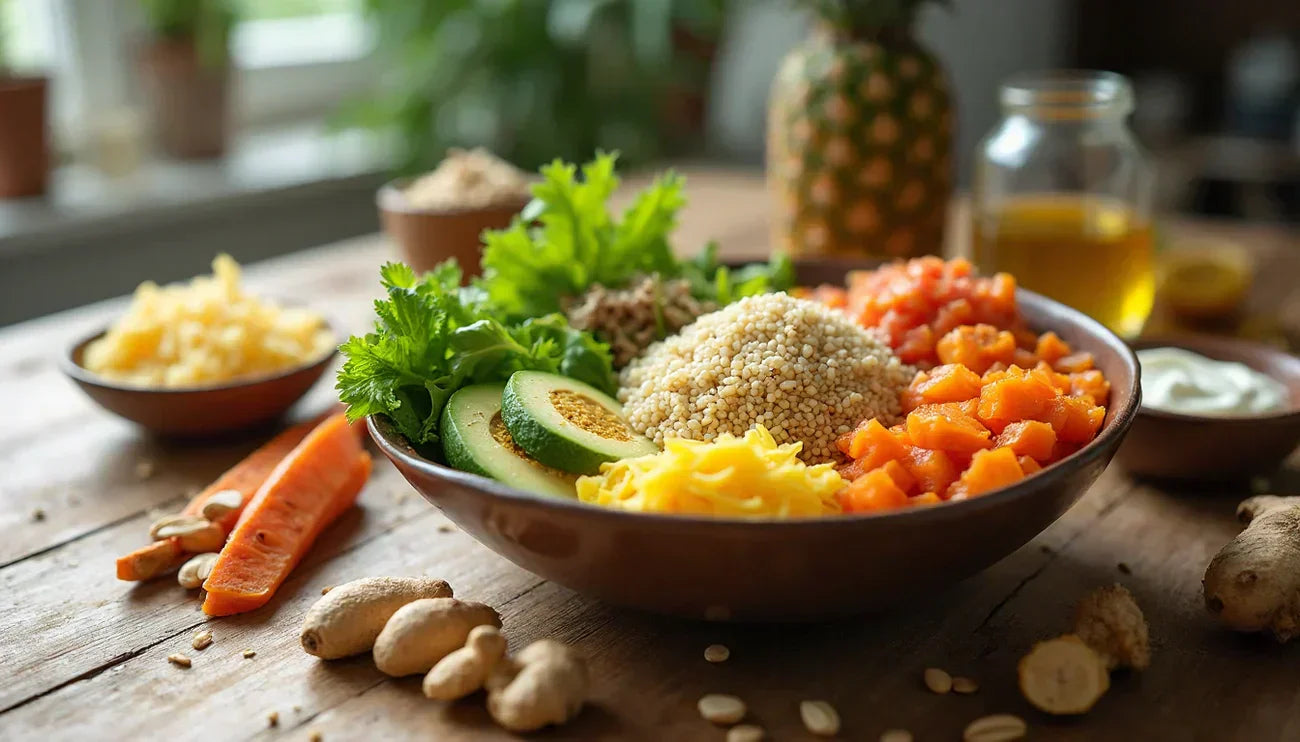If you've ever experienced that uncomfortable full, tight sensation in your belly, you're not alone. Bloating affects nearly one in seven Americans every week, making it one of those surprisingly common problems that nobody really talks about. When your abdomen swells up (typically by about one quart in volume), it's not just annoying – it's downright uncomfortable and affects approximately 14% of people across the United States. If you're wondering what helps with bloating or what relieves bloating fast, you've come to the right place.
Bloating doesn't just happen randomly. You might notice it flares up after certain foods, during times of stress, or when your gut bacteria are out of balance. Food intolerances are a HUGE trigger here - about 20% of people have some type of food sensitivity, with lactose intolerance affecting a whopping 68% of people worldwide. That's more than two-thirds of humans who might struggle to digest dairy properly!
The good news? Nature has provided us with incredible plant allies that can soothe your digestive system and actually reduce that uncomfortable bloat. Herbs like peppermint, ginger, and fennel aren't just old wives' tales – they're scientifically proven to calm your digestive tract and reduce uncomfortable symptoms.
Throughout this article, I'll share the doctor-approved herbs that really work for bloating relief, explain exactly how they function in your body, and show you simple ways to use them for lasting digestive comfort. Your belly is about to feel so much better!
What causes bloating and how herbs can help
Let's talk about what's actually happening in your body when you feel bloated. That uncomfortable full, tight sensation occurs when excess gas gets trapped in your digestive system and has nowhere to go. This super common issue affects between 10% and 25% of otherwise healthy people. Before we dive into solutions on how to get rid of gas and bloating, it's worth understanding what's triggering your bloating in the first place.
Common triggers: food, stress, and gut imbalance
Your digestive discomfort usually starts with what's on your plate. When gut bacteria ferment undigested carbohydrates in your intestines, they naturally produce intestinal gas. This is totally normal, but the bacterial fermentation process goes into overdrive with certain foods and conditions:
-
Carbohydrate malabsorption: When your body struggles to break down specific carbs like lactose, fructose, and those tricky ones found in beans and wheat
-
Small intestinal bacterial overgrowth (SIBO): This happens when gut bacteria that should stay in your colon decide to party in your small intestine instead
-
Constipation: When things are backed up, there's literally less room for gas to move through your system
Stress deserves its own special mention as a major bloating trigger. During stressful periods, cortisol floods your system, altering gut motility and ramping up inflammation. Even worse, stress often leads us to reach for comfort foods that feed our "bad" gut bacteria and can damage the intestinal lining, creating what many people call "leaky gut". It's a vicious cycle that's hard to break without the right support. To break the cycle, start by supporting your gut with a diet rich in soothing, digestive-friendly foods that promote balance from the inside out.
Why natural herbs are effective for digestion and bloating
I'm such a huge advocate for herbs because they provide multi-faceted relief by working through several mechanisms at once. Unlike many pharmaceuticals that come with a laundry list of side effects, botanical medicines support digestive function without causing all those unwanted issues.
Traditional herbal remedies like peppermint, ginger, and chamomile aren't just folklore – they've been scientifically validated for their effectiveness. These plant allies work by:
-
Relaxing intestinal muscles to reduce painful spasms
-
Decreasing inflammation throughout your digestive tract
-
Supporting healthy gut motility so things keep moving
-
Reducing gas production at the source
-
Soothing irritated digestive linings
This is why we've combined these powerful herbs into formulas like Digestive Juice – to address the ROOT CAUSES of bloating rather than just masking symptoms. You have the opportunity to restore beneficial gut bacteria, and you're giving your digestive system complete, holistic support.

Digestive Juice
A fast-acting blend of digestive bitters used before or after meals to support digestion, occasional gas and bloating.*
STAR HERB: Gentian
The coolest part? These herbs have been used for CENTURIES in traditional medicine systems like Ayurveda and Traditional Chinese Medicine. Now modern research is finally catching up and confirming what traditional healers have known all along – herbs offer effective, gentle relief for digestive discomfort.
8 doctor-approved herbs that relieve bloating
When it comes to finding natural gas relief and home remedies for bloating, certain herbs stand out as true digestive heroes. I'm excited to share these eight incredible botanicals that have not only been used for centuries in traditional healing practices but are now backed by modern scientific research too.
1. Peppermint – relaxes the gut and reduces gas
If you've ever had peppermint tea for bloating after a heavy meal, you know how quickly it can soothe your stomach. It’s the best tea for bloating and gas. That's because peppermint contains menthol that literally relaxes those tight intestinal muscles and dulls pain receptors in your colon. It's pretty incredible how effectively it relieves common IBS symptoms like pain, constipation, bloating, and gas. What's even more fascinating is that research shows peppermint oil can actually be MORE effective than fiber and works at least as well as pharmaceutical antispasmodic medications. For the best results, most adults do well with about 0.2-0.4ml of peppermint oil three times daily.
2. Lemon Balm – calms the digestive tract
Lemon balm is one of my absolute favorites for digestive support. This beautiful herb (Melissa officinalis) contains compounds that gently soothe and relax spasms in your digestive system. Beyond just calming things down, it actually offers protective benefits to your stomach lining while reducing inflammation. We've included lemon balm in many of our digestive formulas specifically because it helps decrease abdominal pain and other uncomfortable digestive symptoms.
3. Fennel – eases cramps and supports digestion
Have you ever wondered why Indian restaurants often offer fennel seeds after meals? These tiny powerhouses contain compounds that ease intestinal muscle contractions and support proper digestion. People have traditionally reached for fennel to address bloating, gas, and constipation, and it even helps protect against ulcers. The essential oils in fennel help regulate those intestinal muscles, allowing trapped gas to finally move through and dissipate.
4. Ginger – boosts motility and reduces inflammation
Ginger is truly a digestive superstar. It accelerates gastric emptying (meaning food moves through your system more efficiently) while providing powerful anti-inflammatory benefits. With over 400 natural compounds, ginger encourages efficient digestion so food doesn't just sit in your gut causing discomfort. Multiple studies confirm it reduces gas, bloating, and improves overall digestive function. I always keep ginger on hand - whether as tea, fresh root, or in our herbal formulas.
5. Chamomile – soothes the stomach and reduces bloating
Chamomile isn't just for bedtime! This gentle herb contains flavonoids with documented antispasmodic and anti-inflammatory effects. What I find really impressive is that clinical studies show chamomile significantly decreases the severity of flatulence even after surgery and reduces symptoms of irritable bowel syndrome, including that uncomfortable bloating and abdominal pain. It's gentle enough for daily use but powerful enough to make a real difference.
6. Turmeric – anti-inflammatory effects on the gut
You've probably heard about turmeric for joint pain, but did you know it's amazing for your gut too? Curcumin, turmeric's active compound, provides remarkable anti-inflammatory benefits for your digestive tract. It helps protect your intestinal barrier integrity (super important!) and may even positively influence your gut microbiota composition. Recent scientific reviews have found turmeric particularly helpful with abdominal pain related to IBS. I love incorporating this golden spice into both foods and supplements.
7. Wormwood – stimulates digestive juices
Don't let the name scare you off! Wormwood contains bitter compounds that stimulate gastric juices and bile production. These secretions enhance your digestive efficiency, potentially reducing bloating and indigestion. Additionally, wormwood increases stomach acids and digestive enzymes while promoting healthy muscle contractions in the stomach. The bitter taste is actually ESSENTIAL to getting these benefits - that's why we always recommend tasting your bitters rather than hiding the flavor!
8. Angelica Root – supports regularity and gut health
Angelica root might be less well-known, but it's incredibly effective. It stimulates digestive secretions through its bitter properties, which helps expel excess gas, ease bloating, and improve overall gut function. Furthermore, it supports regular bowel movements, which can prevent the bloating often caused by constipation. Regular elimination is absolutely crucial for preventing bloat, and angelica is one of my go-to herbs for supporting this natural process.
Our Digestive Juice combines several of these powerful herbs into one easy-to-use formula, while Flora V works alongside it to maintain proper gut bacteria balance. Together, they provide both immediate relief and long-term support for your digestive system. Your belly will thank you!
How to use these herbs for best results
The way you take herbs for bloating can make ALL the difference between "meh, I feel a little better" and "wow, my stomach actually feels normal again!" Let me walk you through the best ways to use these plant allies for maximum relief.
Drink as teas or infusions after meals
Herbal teas are one of my favorite delivery methods for bloating relief. They're simple, effective, and there's something so soothing about wrapping your hands around a warm mug when your tummy feels off. For the best results, here's how to prepare each herb:
-
Peppermint and chamomile: Take 1 teaspoon of dried herb, pour hot water over it, and let it steep for 5-10 minutes
-
Ginger: Simmer 2 tablespoons of fresh sliced ginger root in 2 cups of water for about 10-20 minutes (this makes your kitchen smell amazing too!)
-
Fennel: Add 1 teaspoon of fennel seeds to a cup, pour boiling water over them, and let sit for 5-10 minutes
If you want the full therapeutic benefit, most herbalists (myself included) suggest a 15-minute steeping time. The longer steep pulls out more of the medicinal compounds from the plants. I like to drink these teas about 20 minutes after finishing a meal, when my digestive system is working hardest. Short on time? Make a bigger batch and store it in your fridge for up to five days.
Use in combination with Digestive Juice for enhanced effect
If brewing teas feels like too much work (I get it, we're all busy!), Digestive Juice is your new best friend. This fast-acting herbal blend contains multiple digestive herbs in one convenient bottle. Here's how I recommend using it:
-
Apply 6-10 sprays directly on your tongue about 15 minutes before you eat
-
Really taste those bitter flavors before swallowing—I know they're strong, but that bitter taste is actually waking up your digestive juices
-
Forgot to take it before your meal? No worries! You can use it after eating too, or whenever bloating shows up
The bitter compounds in Digestive Juice start working from the moment they hit your taste buds, triggering a cascade of digestive secretions throughout your entire system.

Flora-V
Odor, imbalance and discomfort be gone: meet the pink probiotic that works fast to boo...
Pair with Flora V to support gut flora balance
For those stubborn bloating issues that just won't quit, combining herbal remedies with Flora V can be a game-changer. This approach addresses both the symptoms AND the root cause, since bacterial imbalance is often behind chronic bloating. These two approaches work beautifully together because:
-
The herbs provide quick symptom relief (the "first aid" approach)
-
Flora V helps restore balance to your gut bacteria (the "long-term solution")
-
Many of these herbs, especially fennel and ginger, actually feed your beneficial bacteria with prebiotic compounds
Dosage tips and safety considerations
Before jumping into any new herbal routine, keep these safety tips in mind:
-
Start with smaller doses to see how your body responds
-
If you're taking medications, check with your doctor first—some herbs like licorice can interact with certain prescriptions
-
Pregnant or nursing? Exercise extra caution with herbs
-
For kids, reduce the dosage based on their weight
-
Notice any weird reactions? Stop using that herb right away
Remember, consistency matters way more than quantity. Taking moderate doses regularly will give you much better results than occasionally taking large amounts when symptoms are at their worst.
When to combine herbs with lifestyle changes
Let's be real - herbs are amazing natural supplements for gas and bloating, and digestive discomfort, but they work EVEN BETTER when you pair them with simple lifestyle tweaks. Think of herbs as your baseline support system that gets supercharged when you add in a few strategic habits. Your body will thank you for this holistic approach!
Avoiding foods that cause bloating
I always tell people that even the most powerful herbal remedies work better when you're not constantly bombarding your system with trigger foods. It's like trying to bail water out of a boat while someone keeps drilling new holes - not very effective! Here are the usual suspects that cause trouble for most of us:
-
Beans and legumes full of those alpha-galactosides (FODMAPs) that ferment in your gut
-
Carbonated beverages that literally pump extra gas straight into your digestive system
-
Wheat products with gluten and FODMAPs that many bodies struggle to process
-
Cruciferous vegetables like broccoli and cauliflower - super nutritious but definitely gas-producing
-
Onions and garlic which are packed with fructans that love to ferment in your intestines
You don't need to completely eliminate these foods (I certainly don't - life's too short to never eat garlic!). Instead, try reducing portions or preparing them differently. Soaking beans thoroughly before cooking or steaming cruciferous veggies can make them way easier to digest. And here's my favorite hack - take Digestive Juice before eating these foods to help your body handle them more efficiently.
Mindful eating and chewing habits
How you eat matters just as much as what you eat - something our fast-paced culture completely ignores. When you eat mindfully, you activate your parasympathetic nervous system (the "rest and digest" mode) that's absolutely essential for good digestion.
Chew your food thoroughly - I'm talking about mindful eating - that’s at least 15 chews per bite. This might sound excessive, but it breaks down food mechanically and gives your digestive enzymes more surface area to work with. Your stomach doesn't have teeth, folks!
Put down the phone while eating. Seriously. Eating without distractions helps you notice when you're actually full and prevents that uncomfortable overstuffed feeling. Those fullness signals take about 20 minutes to register anyway, so slow down and give your body time to catch up.
Engage all your senses in the meal. Smell your food, appreciate the colors, notice the textures. This sensory experience actually stimulates digestive secretions before you even swallow your first bite. Pretty cool, right?
Physical activity and posture after meals
This is something my grandmother always said that science now backs up - don't lie down right after eating! Staying upright after meals significantly improves gas transit and gets it out of your system faster. Research shows gas clears much more efficiently when you're upright (72% clearance) versus lying down (49% clearance).
A quick 10-15 minute walk after eating (about 1,000 steps) is like a digestive miracle worker. This gentle movement helps trapped gas move through your system, prevents water retention, and promotes regular bowel movements. I always try to take a little "digestive stroll" after dinner, and it makes such a difference.
Sitting up straight while eating prevents extra pressure on your abdomen that can push stomach acid in the wrong direction. This proper posture creates the ideal environment for Flora V to work its magic, allowing your gut bacteria to establish proper balance without the interference of poor positioning.
Conclusion
Bloating is one of those frustrating issues that affects millions of Americans every single week, yet so many people don't realize just how effective natural solutions can be. Throughout this article, we've explored these incredible herbs that don't just mask your symptoms – they actually address the ROOT CAUSES of your digestive discomfort. Isn't that what we all want? Peppermint physically relaxes those tight intestinal muscles, ginger speeds up how quickly food moves through your system while calming inflammation, and herbs like fennel, chamomile, and turmeric work together to create this beautiful symphony of digestive relief.
How you use these herbs really matters, though. Whether you're sipping them as herbal teas, taking them as natural supplements, or using concentrated formulas like our Digestive Juice, consistency is your best friend here. Using these remedies regularly will give you so much better results than just reaching for them once in a while when you're already uncomfortable. When you pair these herbs with Flora V to restore your beneficial gut bacteria, you're creating a powerful two-pronged approach that tackles both your immediate symptoms AND the underlying imbalances causing them.
I also want to remind you that herbs work even better when you pair them with some simple lifestyle tweaks. Things like chewing your food thoroughly, avoiding your personal trigger foods, and taking those short walks after meals can absolutely amplify what these plant allies are doing for you. Bloating might seem like something you just have to live with, but I promise you – it's not! These remedies and natural herbs for bloating have been used for centuries, and now modern research is finally catching up to what traditional healers have always known.
Your journey toward comfortable digestion starts with these time-tested plant remedies. Now that you know which herbs work best and exactly how to use them, you can finally experience what it feels like to live without that uncomfortable bloating and distension. Take that first step today – I know your digestive system will thank you!



